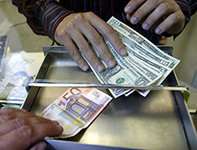|
|
Europe and USA in battle of debts
By Vitaly Salnik
- July 26, 2011
 President Obama is threatening with non-payment of pensions if the government fails to increase the national debt ceiling. The most powerful populist arguments are being used, but Obama has yet to succeed in breaking the resistance of the Republicans in Congress. Experts are speculating: the country is actually threatened by a default, but the U.S. is an unusual economy.
Obama said that he "cannot guarantee" the payment of retirement benefits in August to 27 million people. According to Obama, it all boils down to the legal size limit of public debt that currently is at $14.3 trillion. White House proposes to increase the upper limit by $2.4 trillion. There is a joke in the United States that Obama asked his finance minister: "What number comes after trillion?"
Over the past two years the U.S. budget deficit rose to $2.8 trillion. It is more than it was in the previous 10 years. In February of this year, Obama introduced to Congress a draft budget for 2012 fiscal year with a plan to reduce public spending by 1.1 trillion over ten years. At the same time, both Democrats and Republicans are ready to make a decision to increase the national debt ceiling under certain conditions. Democrats insist on raising taxes, while Republicans want to reduce the social spending.
Termination of social programs protected by Obama will knock the chair from under the first black U.S. president. Analysts believe that his electorate is consumers of the state-assisted programs.
At the same time in 2013 tax raises will be implemented that will affect not only the rich but the middle class as well. However, Republicans and Democrats agree with regard to the elimination of existing tax breaks for the rich and middle class.
As for the statements about the end of the financial world on August 2 of this year in case of the Congress' inability to make a decision to raise the debt ceiling, it is rather an artificially created panic.
Repayment of UST for $30 billion is planned for the beginning of August. In addition, there was an official announcement of the completion of the repurchase program of bonds from the U.S. Federal Reserve at the amount of $600 billion (QE2). This program was created by the Federal Reserve to shape an artificial demand for its own debt instruments. The current political panic attacks, at a closer look at the principles of speculative arithmetic in the debt market, allow the Federal Reserve to maintain a rather comfortable situation in terms of the bonds.
The price of bonds and bonds yields have opposite directions - with an increase of the bond price its yield falls and vice versa. The inability to issue bonds because of the opposition of Democrats and Republicans and the demand for UST leads to a reduction in their profitability and increase of prices for these securities. That is, it makes borrowing cheaper.
The U.S. Federal Reserve is joined by the new head of the pro-American IMF Christine Lagarde, whose refusal to give credit to Greece once again stirred questions about the Euro and the ability of European countries to service their debts. This means that investors can once again run to the U.S. treasuries which fund the U.S. national debt.
|
|
|
|
|
|  |
|
 President Obama is threatening with non-payment of pensions if the government fails to increase the national debt ceiling. The most powerful populist arguments are being used, but Obama has yet to succeed in breaking the resistance of the Republicans in Congress. Experts are speculating: the country is actually threatened by a default, but the U.S. is an unusual economy.
President Obama is threatening with non-payment of pensions if the government fails to increase the national debt ceiling. The most powerful populist arguments are being used, but Obama has yet to succeed in breaking the resistance of the Republicans in Congress. Experts are speculating: the country is actually threatened by a default, but the U.S. is an unusual economy.
 You watched
You watched



